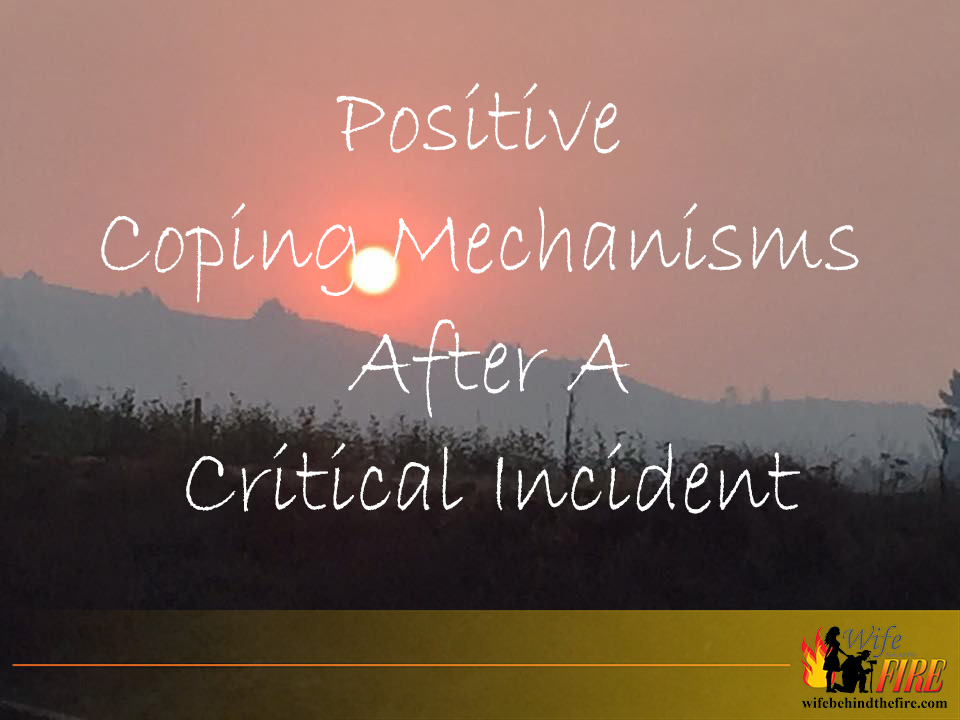 Our firefighters head off to work every single day knowing that they may face an incident that shakes them. Sometimes that incident can replay over and over in their heads causing prolonged trauma. What most people and even Fire Families don’t realize is that when there is an incident that their firefighter has gone through, they too can and often experience some trauma as well.
Our firefighters head off to work every single day knowing that they may face an incident that shakes them. Sometimes that incident can replay over and over in their heads causing prolonged trauma. What most people and even Fire Families don’t realize is that when there is an incident that their firefighter has gone through, they too can and often experience some trauma as well.
During the fires in Sonoma County and Mendocino in October, my family experienced some trauma. When my husband left on the night the fires started, we had no idea where he was going. The cell towers malfunctioned and he was unable to contact us for several days after he left. This put an immense amount of stress on us. At the time, I really had no awareness how badly it was affecting my children. They were more whiny than normal, but I figured that was because their dad was gone. We had been through this before. However, it was more than that.
As spring moves forward and we make our way into summer, I feel it is important that we all take a moment to think about how we will positively respond to critical incident stress. For that reason, I want to take a hot second and share with you some of the things that we practice at home when things get tough.
First and foremost, I want you to know, that asking for help does not make you weak.
I thought for a long time that I needed to keep a stiff upper lip and deal with it on my own. That is the furthest thing from the truth. There are people, trained professionals and just everyday ordinary civilians that want to love on and support you through this disaster. With that said, here are some things that can help:
1. Digital Detox, and yes, that means social media too. With information constantly being streamed to us via social media, television, podcasts, newspapers, etc, it is difficult to get away from all the chatter about the incidents. If watching doesn’t affect you, that’s great, you’re doing better than I am! If hearing or seeing things stresses you out, turn it off. Do not allow the media to dictate what you can handle. Be in control of your environment!
2. “Run as far as you can in the direction of your best and happiest dreams across the bridge that was built by your own desire to heal.” -Cheryl Strayed
This quote resonated with me as I grieved for so many of my loved ones who were evacuated or lost their homes in October. We all have an innate desire to heal, and we are built that bridge with every positive thought we could muster.
Give yourself permission to heal. Even if those around you are still grieving, it’s okay for you to move on. It’s okay for you to rebuild. If you find that it’s overwhelmingly hard, ask for a lifeline. Your department may have professionals that are willing and able to talk with you. This group all by itself has a good group of ladies who would be happy to listen and help. Please do not be afraid to reach out. We will build the bridge together!
3. Don’t feel helpless. Challenge that feeling! Meet it right where it is!

Wait what? What is she talking about?!? How am I supposed to do that???
You feel helpless, but you aren’t! Sometimes the best way to get happy, is to make someone else happy. There are things you can do. My personal way of challenging that feeling, is going and volunteering my time. I have a few irons in the fire as far as relief efforts are concerned and it is the least I can do in these troubling times.
If formal avenues are not your thing, there is power of being kind. Hold a door open for someone. Offer to help an elderly person take their groceries inside. Smile at a stranger passing by.
Connect with others going through the same thing. Even if you don’t talk about it, there is something to be said about being in a room full of people that have been through the same things you have. That’s in part why this group is so popular, because we need to connect with people who get it. Use that to your advantage. You are not alone. Reach out!
4. You’ve got to move it, move it! Exercise helps to balance the chemicals in our brain, thereby making us happy! ZUMBA is a fun way to relieve the stress. There is nothing better than dancing it out as far as I’m concerned. However, if that’s not your thing, a run, hike, bike ride, or brisk walk will also do the trick!
5. Practice Self Care, because let’s face it, if you don’t take care of yourself, who will? While you are taking care of your firefighter, who’s taking care of you? Make sure to make time for your hobbies, get your hair done, go to the spa, and give yourself room to breathe.
6. Eat well, be well. You may have heard the saying “garbage in, garbage out.” It’s true. If you eat garbage, you feel like garbage. Eating highly sugary, fatty snacks, can intensify the stress that you are feeling. Eat foods that are rich in protein, low in sodium and sugar, and always ask for extra veggies on the side. Some mood boosting foods include, blueberries, salmon or any Omega-3 rich foods, bananas, coconut, kale, etc.
7. Try to establish your routine again. There is solace in the mundane rhythm of your life. Get back on track with your work, school, play schedule.
8. Don’t forget to laugh. Even if you have to go to a comedy club to do it, laugh often. Laughter decreases stress hormones and increases immune cells thus improving your resistance to disease and lowering your stress level.
RED FLAG WARNING
Seek help from a professional if you or your Firefighter experience any of the following:
- It’s been 6 weeks and you aren’t feeling any better.
- You are having trouble functioning at work or home.
- You aren’t sleeping or are being woken by nightmares.
- You’re having suicidal thoughts or feelings.
- You are avoiding more and more things relating to the disaster.
I am sure most of you have heard these things before, but if applied properly they can be extremely helpful. Don’t be afraid to reach out to the Wife Behind the Fire Community !
